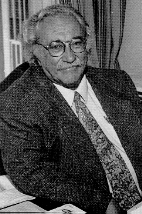ASSOCIATE DIRECTOR
1984-1994

TOM SMITH
Associate Director of the NYS Writers Insitiute
Tom Smith was the Associate Director from August 6, 1984 until his untimely death September 26, 1994 and was instrumental in the founding and establishment of the Institute for the first 10 years. William Kennedy spoke the following words at Tom's memorial service:
"Anybody who knew Tom Smith would be ready to admit that he was larger than life. He was physically a large man, and he probably died trying to do something about that; he was a man of such giant intellect that those who engaged it felt like dwarfs; and he was a man of such abundant generosity of spirit that his sudden loss seems like a punishment to his survivors, his family, and his grand army of friends.
He played a role in the creation and development of the Writers Institute that is difficult to evaluate, for his literary acumen, his brilliance as a scholar, his omnivorous way of reading--he would read two books a night--and in the role he seemed to have been born for--interviewer of writers--will not be duplicated by any single individual. Tom could speak the language of the Russian historian, the Greek poet, the radical politician, the avant garde playwright. We'll need a team of people to replace Tom. And for some of us there will be no replacement." — William Kennedy
We miss you, Tom.
by Charles Koban, Professor Emeritus
Tom Smith, who some readers of these pages will remember as the former Associate Director of the Writers Institute and Host of the PBS series on contemporary writers, has been on my mind for a long time. I first met Tom at Penn State when we were undergraduates together in the English program there. The first class I took with Tom was a survey of English Literature before the Romantics. I remember Tom's performance in that class, it was a performance that overwhelmed all of us, because of his astounding memory. The teacher, Dr. Redenauer, liked to ask us questions based on the text he was using and all of us were dumbfounded because, of course, we remembered very little. But Tom remembered everything, literally everything. I remember the pride I felt when once I caught him in an error, but my pride was misplaced because I knew a superior intellect when I met one. And so I shied away from Tom because I found him overpowering. At the same time, I recognized because of one encounter I had with him after hearing a poet read his children's poetry that Tom was perhaps the most honest man I had ever met. There was a noble side to his honesty, but there was a tragic side too, because he judged himself too harshly. He was embarrassed by his inability to write his thesis on George Moore at Harvard which would have earned him his Ph.D.
This brings us to another side of Tom's character and gifts. He was an adventuresome thinker, and he could not be satisfied with what had already been thought out. Hence, he could not write a thesis on someone who was really a very minor novelist and did not challenge his intellect. He was excited by James Joyce, who always bewildered me. He was excited by the avante garde novelists and poets because they were on the frontiers of thought. Tom taught a course in Time and Consciousness in the novel, which seemed to me traditionalist that I am, such a bold venture in thought that I have often wished I had taken the course. Maybe I would have learned something about the mind that would have clarified the mysterious of thought. I tend to scorn the avante garde writers, but I could not scorn Tom because he had read and remembered almost everything that was worth reading in literature and much that went beyond literature. Not only that but he understood what he read, even if it was outside his field of expertise. He literally knew more than anyone I have ever met, yet he was very modest about his vast knowledge. He never to my knowledge showed it off or boasted about it.
Finally, let me say that Tom was an incredibly compassionate man. He accepted everyone, literally everyone--even his enemies, and he never harbored as far as I knew any resentment toward anyone. He came into his own when he became Associate Director of the Writers Institute. There he was among fellow spirits--and he gave writers, all kinds of writers, a platform from which to speak. He accepted the value of what they had written regardless of who they were. Tom gave a voice to many writers I could not accept and I must say in retrospect, not that we — in the words of a former President of the University at Albany [Patrick Swygert] — had lost a Santa Claus, but that we have lost a giant — a giant perhaps who was too modest to flex his intellectual muscles in public, but to us to knew him — a true giant.
Previous Articles:
Tom Smith interviews William Kennedy
For additional information, contact the Writers Institute at 518-442-5620
or online at https://www.albany.edu/writers-inst.
